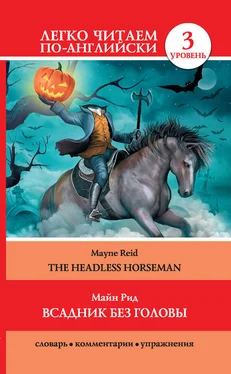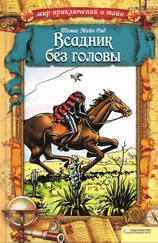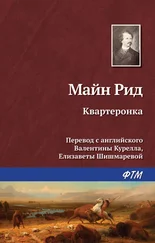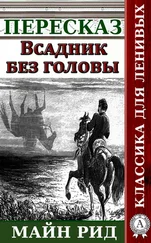Though he saw not him, he was seen by the cavalier in the cloak, following upon the same track, and now scarce half a mile behind.
The latter, on beholding him, gave utterance to a slight exclamation. It was joyful, nevertheless; as if he was gratified by the prospect of at length overtaking the individual whom he had been for ten miles so earnestly pursuing.
Without hesitation, he rode after.
It was a longer interval before the third and hindmost of the horsemen approached the pass that led through the chapparal; but instead of riding into it, as the others had done, he turned off at an angle towards the edge of the wood; and, after leaving his horse among the trees, crossed a corner of the thicket, and came out into the opening on foot.
An hour elapsed, during which the nocturnal voices of the chapparal had kept up their choral cries by a thousand stereotyped repetitions.
Then there came an interruption; abrupt in its commencement, and of long continuance. It was the report of a gun, quick, sharp, and clear. But no other sound succeeded the shot – neither the groan of a wounded man, nor the scream of a stricken animal.
Answer the following questions:
1) Why did Calhoun awaken Henry?
2) What did Henry do when he saw Louise and Maurice together? What did Calhoun want him to do?
3) How did Louise and Maurice behave when Henry appeared?
4) Why did Henry want to overtake the mustanger?
5) Where did Calhoun go after the scene in the garden?
6) Who were the three horsemen?
The planter’s family assembled in the sala were about to begin breakfast, when it was discovered that one of its members was missing.
Henry was the absent one.
“Very strange Henry not being here to his breakfast! Where can the boy be?” asked his father, for the fourth time, in that tone of mild conjecture that scarce calls for reply.
None was made by either of the other two guests at the table.
“Surely he is not in bed till this hour? No-no – he never lies so late. He may be in his room? It is just possible. Pluto!”
He called Pluto, the sable coachee, and ordered him to go to Henry’s sleeping-room and, if he was there, tell him they were half through with breakfast.
“He’s not there, Master Woodley.”
“You have been to his room?”
“I haven’t been to the room itself; but I’ve been to the stable, to look after Master Henry’s horse. That old horse is not there; nor hasn’t been all of this morning. No horse there, no saddle, no bridle; and of course no Master Henry.”
“It don’t follow that Master Henry himself is not in his room. Go instantly, and see!”
“There’s something strange in all this,” pursued the planter, as Pluto shuffled out of the sala. “Henry from home; and at night too. Where can he have gone? I can’t think of any one he would be visiting at such unseasonable hours!”
“Why is Henry still absent?” reflected the young Creole. “I’ve sat up all night waiting for him. He must have overtaken Maurice, and they have fraternised. I hope so; even though the tavern may have been the scene of their reconciliation.”
Her reflections were interrupted by the reappearance of Pluto; whose important air proclaimed him the bearer of eventful tidings.
In a voice that betrayed a large measure of emotion Pluto told the planter that Henry wasn’t in his room but his horse was there – at the gate.
“Ah, Master Woodley,” added he, “I fear that the old horse has lost his rider! Come to the gate and see for yourself.”
Not only the planter himself, but his daughter and nephew, hastily forsaking their seats, and preceded by the sable coachman, made their way to the outside gate of the hacienda.
A sight was there awaiting them, inspired all three with the most terrible apprehensions.
A negro man – one of the field slaves of the plantation – stood holding a horse, that was saddled and bridled. The animal was snorting and stamping the ground, as if but lately escaped from some scene of excitement, in which he had been compelled to take part. He was speckled with dark spots that were all of the colour of coagulated blood.
The horse came from the prairies. The negro had caught him, on the outside plain, as, with the bridle trailing among his feet, he was instinctively straying towards the hacienda.
All present knew him to be the horse of Henry Poindexter. And the dark red spots on which they were distractedly gazing had spurted from the veins of Henry Poindexter. They had no other thought.
***
Hastily construing the sinister evidence, the half-frantic father leaped into the bloody saddle, and galloped direct for the Fort.
Calhoun, upon his own horse, followed close after.
The news soon spread abroad. Rapid riders carried it up and down the river, to the remotest plantations of the settlement.
Henry Poindexter – the noble generous youth who had not an enemy in all Texas! Who but Indians could have spilled such innocent blood? Only the Comanches could have been so cruel?
Among the horsemen, who came quickly together on the parade ground of Port Inge, no one doubted that the Comanches had done the deed. It was simply a question of how, when, and where.
These were the questions discussed by the mixed council of settlers and soldiers, presided over by the commandant of the For.
It was decided that the searchers should proceed in a body. [39]A proposal to separate the command into several parties, and proceed in different directions, met with little favour from any one.
The direction still remained the subject of discussion.
What direction had been last taken by the man who was supposed to be murdered? Who last saw Henry Poindexter?
His father had last seen his son at the supper table; and supposed him to have gone thence to his bed.
The answer of Calhoun was less direct, and, perhaps, less satisfactory. He had conversed with his cousin at a later hour, and had bidden him good night, under the impression that he was retiring to his room.
While the inquiry was going on, light came in from a quartet hitherto unthought of. The landlord of the Rough and Ready, who had come uncalled to the council, after forcing his way through the crowd, proclaimed himself willing to communicate some facts worth their hearing – in short, the very facts they were trying to find out: when Henry Poindexter had been last seen, and what the direction he had taken.
Oberdoffer’s testimony was to the effect: that Maurice the mustanger – who had been staying at his hotel ever since his fight with Captain Calhoun – had that night ridden out at a late hour, as he had done for several nights before.
He had returned to the hotel at a still later hour; and finding it open, had done that which he had not done for a long time before – demanded his bill, and to Old Duffer’s astonishment settled every cent of it!
Where he had procured the money God only knew, or why he left the hotel in such a hurry.
What had all this to do with the question before the council? Much indeed. About twenty minutes after the mustanger had taken his departure from the hotel, Henry Poindexter knocked at the door, and inquired after Mr Maurice Gerald; on being told the latter was gone, as also the time, and probable direction he had taken, the young gentleman rode off at a quick pace, as if with the intention of overtaking him.
The information, though containing several points but ill understood, furnished a sort of clue to the direction the expeditionary party ought to take. If the missing man had gone off with Maurice the mustanger, or after him, he should be looked for on the road the latter himself would be likely to have taken.
Читать дальше
Конец ознакомительного отрывка
Купить книгу








